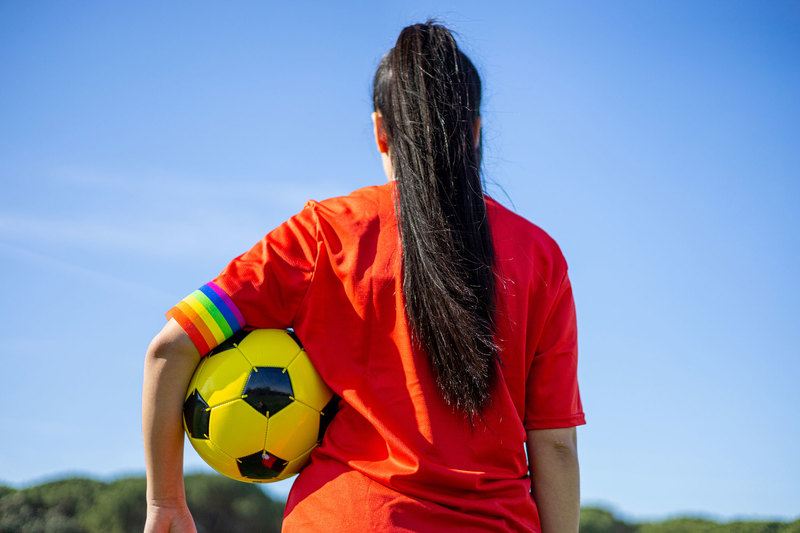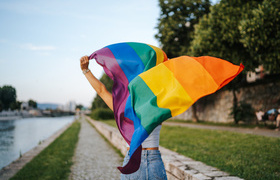Transgenderism in sport: unfair advantage or the right thing to do?
30 August 2023 | Story Lisa Templeton. Photo iStock. Read time 8 min.
In March 2023, World Athletics banned transgender women from track and field events, casting trans women to the athletic shadows and creating yet another stumbling block for South African hero and double Olympic gold medallist Caster Semenya, now 32. When international sports bodies define the rules by which we play at elite level, what does it mean at university level?
How do we embrace transgenderism in sport to ensure equitable access to sporting opportunities, provide support and embrace initiatives towards a vibrant and inclusive student-centred environment, was the topic tackled by panellists at the three-day National Association for Student Development Professionals’ (Nasdev) Women in Leadership Conference, themed “Achieving Gender Parity – Include, Enrich, Innovate”.
“The world is changing,” said Cecilia ‘Coach’ Molokwane, the president of Netball SA, on the rostrum fresh off the success of South Africa hosting the Netball World Cup and placing sixth against the world’s best. “When we grew up, netball was for women and soccer and rugby were for men. Now women can play football, and men can play netball. When it comes to opening doors to transgender sportspeople, it is just another challenge, and where there is a challenge, there is always a solution.”
In the recent 2023 Netball World Cup, the Canadian team, with minimal fuss, included star midfielder, Quinn, an openly transgender athlete who dropped their first name after coming out as non-binary in September 2020. In the same month, World Aquatics announced an open category for athletes whose gender differed from that at birth, a compromise on the ban of 2022.
“Yes, the wheels in society are turning, but they are turning very slowly.”
“Yes, the wheels in society are turning, but they are turning very slowly,” said Nomsa Mahlangu, the president of University Sports SA (USSA) and senior director for sport at the University of Johannesburg. A ground breaker herself, she is the first woman to serve as president of USSA, and is the first woman to be democratically elected to the SA Football Association, a traditionally male-dominated arena.
“By hosting this event, we are creating an opportunity to amplify the voices of women, and giving a platform to address the issues facing women across the board, something which is opportune during Women’s Month,” said Pura Mgolombane, the executive director of Student Affairs at UCT. “Through this conference, we intend to give prominence to such issues, and their impact on women, with a view [of] co-creating befitting and liberating solutions.”
Sport is about access, enjoyment and equity
It is critical to understand the environment in which the discussion takes place. Sport is governed by federations – international and national federations – to which USSA is affiliated and by which it is governed, Mahlangu emphasised.
Policies are still not clear. “SASCOC [SA Sports Confederation and Olympic Committee] currently lacks a comprehensive policy, or clear guidelines, regarding the participation of transgender athletes in sports in South Africa,” said Mark Bashe, the manager of Sports and Recreation at UCT’s Department of Student Affairs.
“Consequently, all sports federations in our country find themselves in a dilemma, striving to strike a balance between promoting transgender athlete inclusion, while also respecting the boundaries of their mandates. The resolution of this issue awaits global consensus and direction from international sport federations before it can be effectively implemented within South African universities, as overseen by USSA.”
Mahlangu added: “Federations may mean there are limitations to what we can do, but that doesn’t stop us at individual sport level. Sport is about access, enjoyment [and] equity. We need to have policies that accommodate all our students, regardless of race or gender. It is vital that our institutions are inclusive.”
She added that within USSA, students were largely accommodated. If the student identifies as “she”, and the institution has registered her as “she”, a trans woman can take part.
The transgender community needs to help us drive change
“Where is the transgender community?” asked Molokwane. “When you work with me, then I understand what needs to be done. If we can take netball from an all-women sport to having a rising, men’s championship team that we took to an international [competition] for the first time last year, we can work together to make this happen.”
Molokwane added that acceptance begins at home, and that old ideas held by the parents of her generation no longer applied to today’s world.
“In a historically significant breakthrough, we had our first transgender athlete in the Netball World Cup. We did need to sit in council to discuss it, but it is not an issue for raised eyebrows. Netball is there to take on everybody, so let us work towards equality.”
“It starts by making noise, and we, as leaders and people with power, have to step up to do something for our own.”
Her message was that no one body, or individual, can bring about change. South Africans together, transgender or not, need to stand against the discriminatory policies of bodies such as the Olympic and Commonwealth committees, and world bodies of athletics and other sports.
“Sports SA, or athletes like Caster, cannot do it alone. Look at Caster, she may have won at a human rights level, but she is an athlete and she still wants to compete, to break records. It starts by making noise, and we, as leaders and people with power, have to step up to do something for our own.”
Mahlangu also called on the transgender community to rise into positions of leadership to help bring about change from the inside.
“You, as students, need to get actively involved. As universities, let’s have internal leagues where teams just play at campus level for enjoyment.”
Traditional bias in sport and the power to change the status quo
It is not to say change is easy. Gender bias, and bias towards the big male sports in terms of resources, salaries and spectator turnout, need conscious changing.
For example, Mahlangu cited the sports scholarships available at UJ when she first arrived, which favoured the big rugby, rowing and athletics stars.
“People hated me taking money from big rugby, but a sporting code is a sporting code, and a woman who plays three times a week is as worthy.
“When you get to tables where decisions are made, there are less women to be seen. Everywhere I go, I advocate for inclusivity, and not just for men and women, but for everyone regardless of who you are.
“Shine a light wherever you are.”
“Shine a light wherever you are,” Mahlangu concluded.
It is thanks to those who have shone a light, that the extraordinarily talented players of South African women’s football side, Banyana Banyana, now get the same appearance fee as the male Bafana side.
“When I came to netball, I knew I must be the change I wanted to see when I was a player, and I ensured our national players get a salary every month. Go and challenge management,” Molokwane agreed.
“The more you knock on doors, the more you will be heard. After all, if a human being can make a policy, a human being can change a policy. You, SRC [Students’ Representative Council] members, how many of you have looked at your policies for the LGBTQIA+ community or the disabled to see if it needs updating?
“Try, and fail, but never fail to try.”
 This work is licensed under a Creative Commons Attribution-NoDerivatives 4.0 International License.
This work is licensed under a Creative Commons Attribution-NoDerivatives 4.0 International License.
Please view the republishing articles page for more information.










